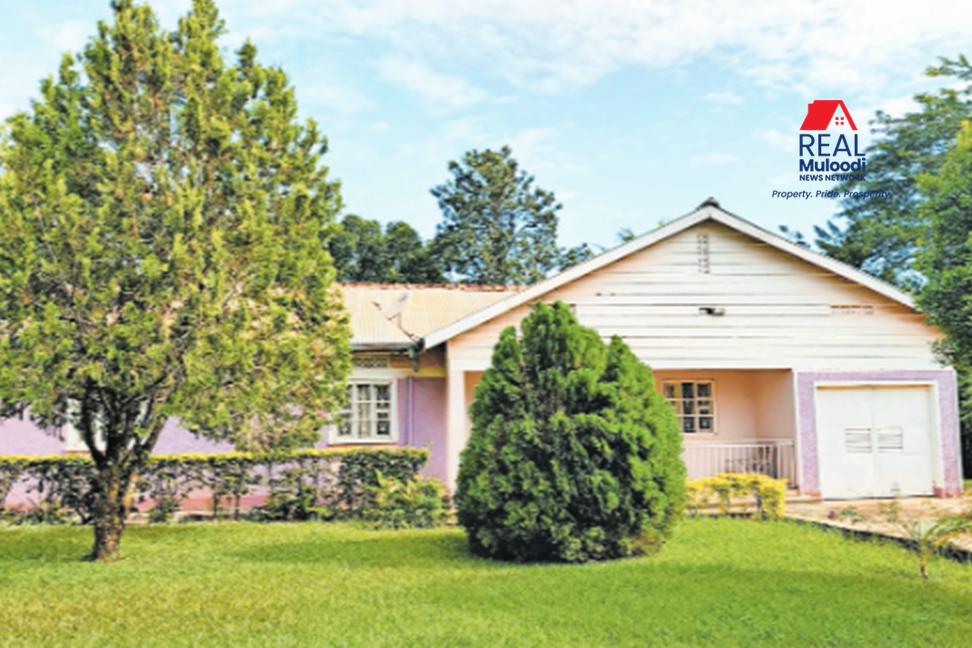UGANDA, Kaberamaido | Real Muloodi News | Grace and John Ekudu’s country house in Kaberamaido District stands as a testament to vision, perseverance, and adaptability.
Initially conceived as a family retreat and retirement home, the house has evolved into a thriving, aptly named Little Orchard Guesthouse. The journey of transforming the country house into a homestay business began in 1993 and reflects a blend of personal and community-centred goals.
Acquiring the Land for the Country House
In 1993, inspired by his father, John Ekudu and his wife Grace purchased four plots of land, each costing UGX 200,000. The combined one-acre property was situated about 8 kilometres from their family home. Recognising the potential for expansion, they later bought an additional acre at UGX 3 million, a significant increase reflecting the rising value of land in the area.
“We wanted a place that would serve as a retreat while remaining connected to the community,” Grace Ekudu explained.
Designing and Building the Country House
Construction began two years later. Drawing inspiration from staff houses at Kabanyoro University Farm, the Ekudus designed a four-bedroom house with spacious living areas, two porches, a kitchen, a dining room, and bathrooms.
“We modelled the house after those in Kabanyoro, focusing on storage and spaciousness,” Grace shared.
At the time, Kaberamaido’s remoteness presented logistical challenges. Building materials were sourced from Kampala and Soroti, while wood was procured locally. Skilled carpenters from Kampala completed intricate woodwork, staying on-site for a month. Despite these difficulties, the house was completed over several years at a cost of approximately UGX 60 million.
By 2006, the house was ready to host major events, including their daughter’s introduction ceremony. The spacious design and lush green compound, dotted with fruit trees, received widespread admiration from guests.
The Little Orchard Guesthouse
In 2000, the Ekudus moved into their country house. During visits by colleagues and officials to Kaberamaido, the house often served as a place of accommodation due to the lack of suitable lodging in the area. Over time, the increasing demand for overnight stays prompted the couple to formalise their hospitality offerings.
Realising the potential of their property, they named it Little Orchard Guesthouse, inspired by the fruit trees surrounding the home. The business was registered, and a trading license was obtained. Lodging fees were set at UGX 30,000 per night for bed and breakfast, targeting clientele who valued comfort and affordability.
To manage the guesthouse effectively, the Ekudus initially relied on family members living on-site. Later, they hired permanent staff to maintain the property and cater to guests.
As Kaberamaido grew, the demand for accommodation increased, particularly among civil servants and visiting groups. Recognising this opportunity, the Ekudus expanded their property by adding two cottages. This decision proved timely when they received a booking from 35 Americans.
“We only had nine beds and four bathrooms at the time,” Grace recalled. “To accommodate everyone, we purchased six camping tents and created outdoor sleeping areas under a tuplin for rain protection.”
Since then, the guesthouse has hosted various groups, including 16 Ministry of Education and Sports (MOES) officials who managed the Secondary School National Games in 2024. Many repeat visitors have described Little Orchard Guesthouse as a “home away from home.”
Balancing a Country House and Guesthouse Operations
Managing a country house that also functions as a guesthouse requires strategic planning. During visits to Kaberamaido, the Ekudus often reserve their bedroom to ensure it is available for personal use.
“When we travel with our children, we book the entire house,” Grace noted.
The Ekudus also adhere to strict house rules aligned with their Christian values. Guests must confirm legal marital status if they wish to share a room, and short-term stays are not permitted. Alcohol consumption is restricted to outdoor spaces, and only non-alcoholic beverages are allowed indoors.
“We want our guests to feel at home while respecting the values we hold dear,” Grace said.
Guests are even given access to the kitchen to prepare meals of their choice, fostering a sense of community during their stay.
While the guesthouse generates income, the Ekudus emphasize that their primary goal is to offer hospitality.
Monthly earnings range between UGX 500,000 and UGX 2 million, depending on the number of guests and their length of stay. These funds help cover maintenance costs, which include staff salaries, utilities, and supplies.
However, running the guesthouse is not without challenges. Maintaining the property requires regular investment, and some supplies must be transported from cities like Kampala, Soroti, or Lira.
“There are months when we only have a handful of guests, yet the expenses remain constant,” Grace explained.
Future Plans for the Country House
Despite the challenges, the Ekudus are optimistic about the future of Little Orchard Guesthouse. Plans are underway to expand the property further by adding conference facilities. Additionally, they hope to establish a coffee house that would serve both guests and the local community.
“Our dream is to create a space that brings people together while contributing to the economic growth of Kaberamaido,” Grace shared.
What began as a family retreat has become a beacon of hospitality in Kaberamaido District. The Ekudus’ country house, now known as Little Orchard Guesthouse, reflects their commitment to creating a welcoming space for visitors while preserving the essence of their home.
Through careful planning and a dedication to serving their community, Grace and John Ekudu have turned their country house into more than just a residence—it is a destination that fosters connection, comfort, and opportunity.
READ MORE LIKE THIS:
Knight Frank Survey Shows African Home Buyers Prefer Greener and Rural Homes



